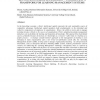10 search results - page 2 / 2 » Knowledge and Planning in an Action-Based Multi-agent Framew... |
ECIS
2004
13 years 7 months ago
2004
In the knowledge economy, a firm's intellectual capital represents the only sustainable source of competitive advantage. Intellectual capital manifests itself, predominantly,...
JAPLL
2008
13 years 5 months ago
2008
In this paper, we study the following basic problem: After having executed a sequence of actions, find a sequence of actions that brings the agent back to the state just before th...
ATAL
2010
Springer
13 years 6 months ago
2010
Springer
Planning how to interact against bounded memory and unbounded memory learning opponents needs different treatment. Thus far, however, work in this area has shown how to design pla...
GIS
2009
ACM
13 years 9 months ago
2009
ACM
Geospatial information (GI) constitutes a significant portion of available data and are a key factor in planning and decision-making in a variety of domains,such as emergency man...
BMCBI
2010
13 years 5 months ago
2010
Background: Determining a suitable sample size is an important step in the planning of microarray experiments. Increasing the number of arrays gives more statistical power, but ad...

